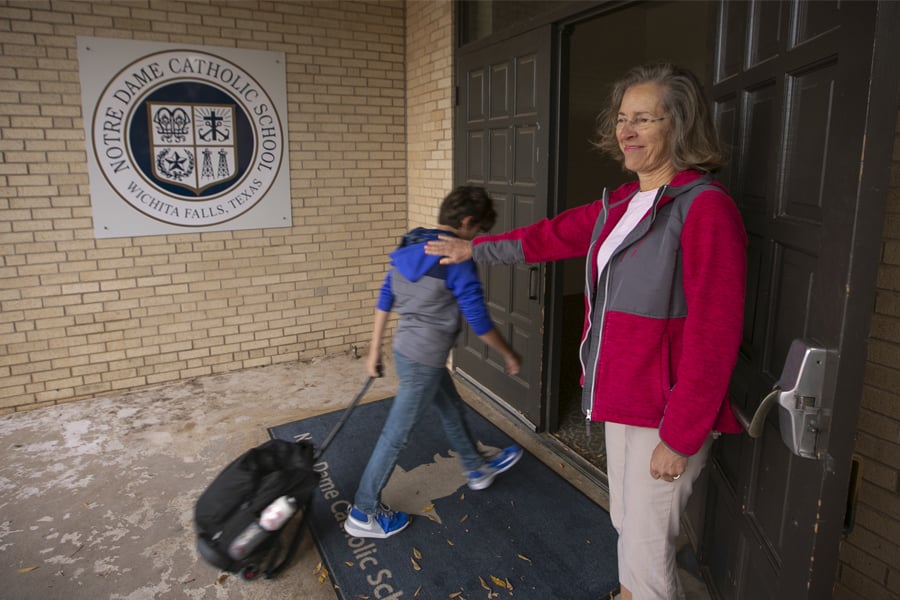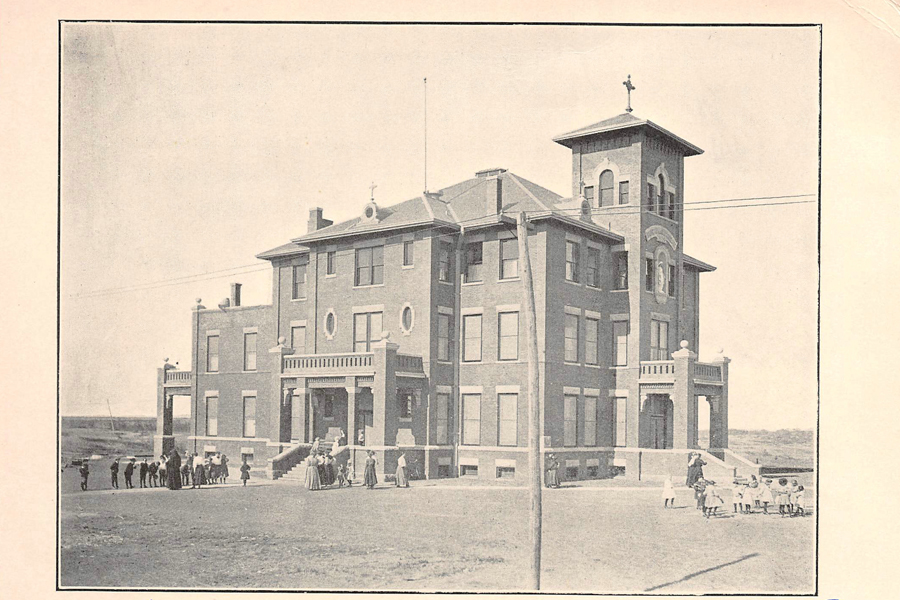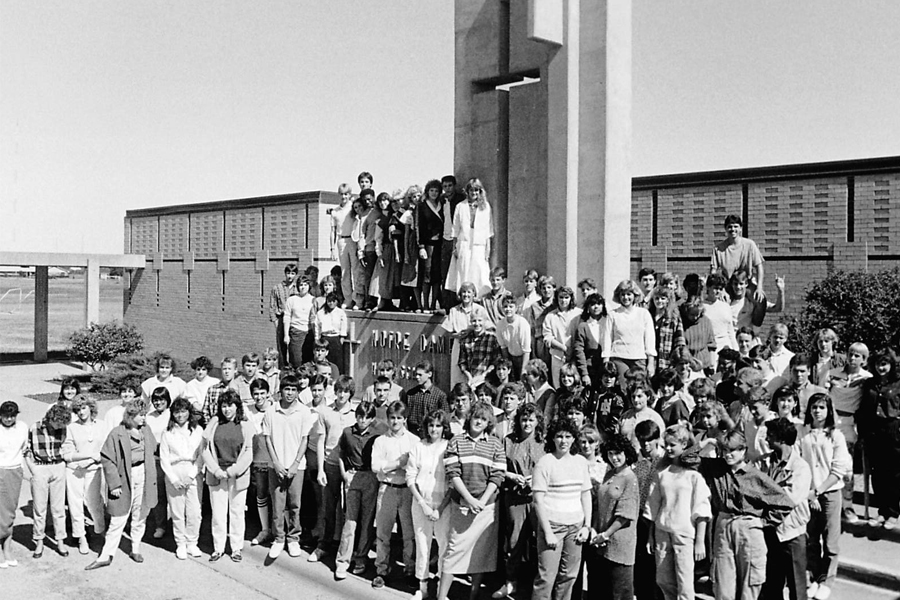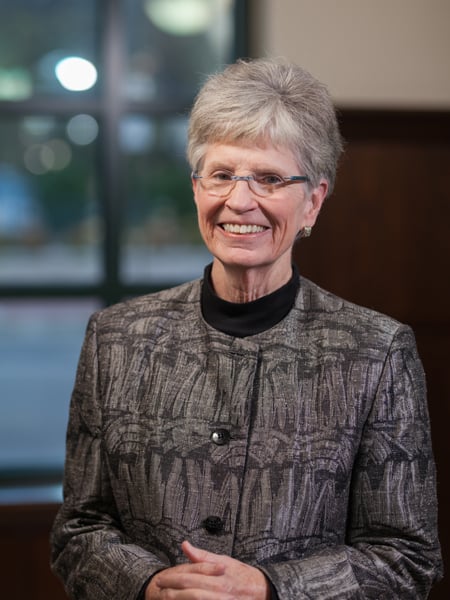Hope, gratitude, and grief coexist as Notre Dame Catholic School ceases operations

Mary Cluley, who teaches physical education, greets students arriving at Notre Dame on November 9, 2018. (NTC/Rodger Mallison)
Before Wichita Falls had a permanent priest, it had a Catholic school.
Wichita Falls was mission territory when a series of letters began on September 16, 1903, between Mother Teresa Brennan, provincial superior of the Sisters of St. Mary in America, Wichita Falls Mayor Charles Bean, Father John Goessens of Henrietta, Diocese of Dallas Bishop Edward Dunne, and the Wichita Falls Board of Trade.
Although the population was smaller than other cities in which the religious order had established schools, Fr. Goessens assured Mother Teresa that Wichita Falls was “very booming.”
In a letter to Mayor Bean on February 13, 1904, Mother Teresa committed to providing a school for the 30 Catholic families in Wichita Falls. She wrote, “Our best endeavors will be exerted in giving the good people of Wichita Falls an institution of learning of which they may be proud.”
With the help of God, Mother Teresa Brennan, and the religious women and men who followed her, succeeded.
Documents in the North Texas Catholic archives reveal the enthusiasm and energy behind the beginning of Catholic education in Wichita Falls, and not just among the small Catholic community, but also non-Catholic businessmen and civic leaders.
In fact, non-Catholics donated most of the $25,000 raised to purchase the land for the school. When the sisters opened the doors of the three-story, red brick building on September 5, 1905, Mayor Bean’s three children — non-Catholics — were among the 48 students in attendance.
The school grew quickly, and by the end of the first school year almost 150 students, including a small number of boarders, were enrolled at the Academy of Mary Immaculate. Six sisters of St. Mary of Namur were the original teachers at the school. In the coming decades, the religious order would place teachers at 30 Catholic schools in Texas.
Sister Ginny Vissing, SSMN, followed those original sisters by a few generations. She taught full time at the Wichita Falls school for a dozen years, then continued for almost 30 years on a part-time basis, teaching music for liturgy while she served as director of religious education for Our Lady Queen of Peace Parish, until she retired in 2017.

She described her predecessors, “The sisters who founded the school and other sisters early on were brave. They started with very little, and God multiplied their efforts. Their love for children and their charism for teaching led them to touch lives and hearts. Grace was at work in them, and because it was grace, it continued for decades.”
As the need for Catholic education in the area continued to grow, a second Catholic school in Wichita Falls, Our Lady of Guadalupe, originated in 1928 as a catechetical center for children of Mexican immigrants. By 1957, more than 150 students moved into a new building for kindergarten through sixth grade. The curriculum still focused on reading and language arts for students learning English as their second language.
As the population of Wichita Falls increased, Our Lady Queen of Peace opened a parish school in 1954, run by Benedictine sisters, which merged with Sacred Heart Parish’s school in 1968.
Brothers of the Congregation of the Holy Cross came to Wichita Falls to oversee the high school of the Academy of Mary Immaculate, which they renamed Notre Dame High School in 1965, the year before moving into a new facility.
In 1976, a reorganization brought Our Lady Queen of Peace School and Notre Dame High School together under the leadership of the Catholic Diocese of Fort Worth.
Notre Dame Catholic School will cease at the end of this school year, due to declining enrollment, years of annual expenses exceeding income, and many years of costly deferred maintenance on the aging buildings.
The 117-year-old school brought a faith-infused, quality education to generations of students in the area.
Deacon Jim Bindel, pastoral assistant of Our Lady Queen of Peace Parish, attended Catholic schools in Wichita Falls from first through 12th grades. His wife, Susan, attended from second to 12th grades, and her father helped raise donations for the football field and stands at Notre Dame.
He fondly remembers the “beautiful journey” of Catholic education with the Benedictine sisters in elementary school, followed by the SSMNs and Holy Cross brothers in middle and high school. He believes receiving a Catholic education laid a strong foundation of faith that kept him rooted as he attended college in the “tumultuous ‘60s.”
He conceded that the closing of the school is distressing, but he acknowledged the financial struggles the school has experienced in recent decades. He said, “I’m thankful that it’s been open for the last 20 years, in these difficult times.... The decision was not made hastily.”
Melissa Kasmeier, interim school superintendent of the diocese, said shutting down Notre Dame “was an extremely difficult decision. I don’t think that you ever come to a decision to cease operations without several years of discussions and assessments. It really came down to a couple of things: all the deferred maintenance on the buildings so the students’ and teachers’ safety is not compromised, but then also the enrollment and how that impacts your operational, year-to-year budget.”

A 2019 assessment made at the Wichita Falls pastors’ request and presented to the school community noted that the elementary school requires $6.2 million in repairs and renovations, and the high school needs $9.9 million to bring the facility to acceptable standards.
Furthermore, student enrollment has declined from 511 twenty years ago to an average of about 210 students. A demographic study predicted flat population growth in the Wichita Falls area, especially among families with school-aged children.
The school has borrowed more than $800,000 from the diocese to cover operational expenses since 2015. The loan does not include tuition assistance and grants from the Advancement Foundation and Catholic Diocese of Fort Worth, which totaled almost $150,000 in the last two years.
Unfortunately, a similar pattern of declining enrollment and financial instability can be found in Catholic schools nationwide. According to the National Catholic Educational Association, this year Catholic school enrollment declined by 6.4 percent, the largest decrease in 50 years. More than 200 Catholic schools in the U.S. were shuttered at the end of the 2019-2020 school year.
Among the factors influencing school operations, according to Kasmeier, are the reduction in religious sisters and brothers teaching in the schools. She said, “Back in the 1960s you had predominantly [consecrated] religious teaching. All of that’s shifted, and now the laity is teaching, and that [affects] your budget and the increased expenses to educate the children. Payroll expenses, of course, take the majority of your budget.”
Kasmeier also observed that tuition-free charter schools compete with Catholic schools for enrollment among some families.
She noted, “We are grateful for Notre Dame’s contribution to Catholic education over the last 100 years. It met the needs early on, and it continued to work to meet the changing needs of the community.”
Bishop Michael Olson added, “While the ceasing of Notre Dame Catholic School is very sad, it is the sadness of transition and not the sadness of failure. The apostolate of Catholic education in Wichita Falls has gone through transition of the passing of one institution to a subsequent institution as means of Catholic education throughout the past 117 years.
“Now is a time for thanksgiving for fruitful graces afforded to so many people through the institution of Notre Dame Catholic School in Wichita Falls. It is also a time for the renewal of Christ-centered family-based catechesis as the foundation for Catholic education into the future,” he said.
In addition to gratitude, Deacon Jim Bindel expressed that as Christians, we hold onto hope. “Hope is a wonderful virtue,” said the Notre Dame graduate. “As Catholics, we know the virtues of faith, hope, and love. But people tend to overlook hope. Even when we die, we hope in the resurrection with Christ.”
His brother, David Bindel, was ordained a permanent deacon in 2020 and serves as the pastoral assistant of Sacred Heart Parish in Wichita Falls.
Deacon David Bindel acknowledged the closure of Notre Dame will leave a void in the faith community of Wichita Falls. Parents and parishes stand ready to help pass on the faith to the next generation. He offered that Wichita Falls parishes have robust youth ministries and religious education programs for Catholics of all ages.
He said, “Our focus is to have [religious education] available for any family searching for deeper faith. For Mom, Dad, and the family, students of all ages. No matter the age, we are still learning and growing in faith.”

Sr. Ginny, the retired Notre Dame teacher, lives near the elementary and high school campuses, and she anticipates missing the rhythm and noise of the school year in August.
She remembers teaching first grade at Notre Dame as a “great joy.” The young students required “lots of energy,” she recalled, as she had to juggle the role of “teacher, social director, nurse, peacemaker, and mother. But the students are so good, so simple, and so sweet.”
Traditions such as dressing as saints for All Saints Day and the May Crowning’s procession with flowers are special memories for Sr. Ginny. “When you enrich the liturgy and make it colorful and beautiful, the kids really enjoyed it,” she recalled.
Still, she said, “The grace of the Holy Spirit will last. That is our hope, even in the ending of Notre Dame. The work of the Holy Spirit will continue in some form or another. It’s all the work of God, and we must trust that the work of God will continue.”
Sr. Ginny said the Sisters of St. Mary of Namur are grappling with the reality that two schools they founded — Our Lady of Victory Catholic School and Notre Dame — will close at the end of the school year. She said, “It’s a time of letting go, which can be very difficult.”
Today, the sisters demonstrate the same reliance on God’s providence that Mother Teresa Brennan demonstrated when she agreed to build and staff the Academy of Mary Immaculate in Wichita Falls.
Sr. Ginny said, “We will let go of the past, and trust, and accept God’s plan for the future. We expect God to renew the face of the earth.”
